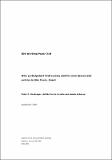Who participates? : civil society and the new democratic politics in São Paulo, Brazil

Download
Date
2003Author
Houtzager, Peter P.
Gurza Lavalle, Adrián
Acharya, Arnab
Metadata
Show full item recordImpact
Abstract
This paper explores the participation of collective civil society actors in institutional spaces for direct citizen participation in the city of São Paulo, Brazil. The data was produced by a unique survey of civil society actors who work for, or with, sectors of the lower-middle class, the working class, and the urban poor. The paper identifies factors that influence the propensity of civil society actors to participate in three types of institutions: the participatory budget, the constitutionally mandated policy councils, and other local participatory councils and programmes. Many political leaders, policy-makers and researchers believe that such forms of direct citizen participation can help democratise and rationalise the state, as well as provide politically marginalised populations with a say in policy. Whether these hopes materialise depends in part on the answer(s) to a question the literatures on civil society, citizen participation and empowered participation have not addressed – Who Participates? Contrary to the focus on autonomy in much of the work on civil society, the statistical findings support the claim that collective actors with relations to institutional actors, and the Workers’ Party and State actors in particular, have the highest propensity to participate. The findings also support the idea that the institutional design of participatory policy-making spaces has a significant impact on who participates, and that this impact varies by type of civil society actor. Unlike what has been found in research on individual citizen participation, there is no evidence that the “wealth” of collective actors influences participation.
